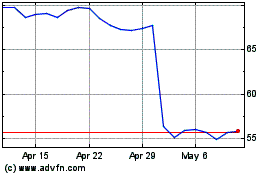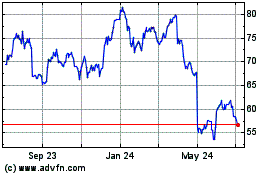By Allison Prang and Jennifer Calfas
The number of newly reported coronavirus cases across the
country remained short of highs seen in late July, but a drop in
testing in some states could be obscuring the extent of the virus's
spread.
Across the U.S., new cases topped 52,000 on Wednesday, bringing
the total to more than 4.8 million, according to data compiled by
Johns Hopkins University. That represents an increase from earlier
in the week, when the number was closer to 45,000, but lower than a
week earlier when more than 68,000 cases were reported. The
national death toll from the pandemic surpassed 160,000.
Seven states saw the seven-day average of new confirmed cases
rising faster than the two-week average as of Aug. 5, according to
a Wall Street Journal analysis of Johns Hopkins data. That held
true in 38 states a month earlier, so the data reflect declines in
reported new cases in a swath of the country.
It is the first time since March that fewer than 10 states had a
seven-day moving average that was higher than the 14-day average.
Comparing the one- and two-week averages of new cases helps smooth
out anomalies in the data, such as lags in reporting.
The recent drop in the number of reported cases, however, could
be tied in part to a decline in testing. In 30 states, the
seven-day average number of tests per 1,000 people was down from a
week earlier, according to data from Johns Hopkins. For six states
-- Florida, North Carolina, South Carolina, Texas, Utah and
Washington -- testing has been trending down for at least two
weeks, according to the data. In 13 states, testing was flat.
Testing and contact tracing are seen as essential to containing
the virus. But demand has outstripped supply. Some health
authorities in the U.S. started narrowing recommendations for who
should undergo coronavirus testing because of lean testing supplies
and delays in getting results.
CVS Health Corp., the biggest retail chain conducting Covid-19
tests in the U.S., said Wednesday it had temporarily reduced the
amount of new tests it administered while adding additional labs to
process backlogged results. Additionally, in California, which has
struggled to contain a resurgence of the virus, the Department of
Public Health said issues with the electronic laboratory reporting
system may have led to an underreporting of cases.
In Ohio, Gov. Mike DeWine's office said Thursday night that he
had tested negative for Covid-19, following an announcement earlier
in the day that the Republican governor had tested positive ahead
of a scheduled meeting with President Trump in Cleveland.
During a second round of testing Thursday afternoon, a more
sensitive test that looks for the genetic material of the virus
that causes Covid-19 was administered to Mr. DeWine, his wife, Fran
DeWine, and staff members. All tested negative, and the tests were
run twice, the governor's office said.
Mr. DeWine didn't meet with Mr. Trump. In March, Mr. DeWine was
among the first U.S. state leaders to take steps to slow the spread
of the coronavirus.
A majority of Americans believe rules meant to slow the spread
of the coronavirus were lifted too soon, according to a new poll
from the Pew Research Center that surveyed 11,001 adults in July
and August as coronavirus infections increased in dozens of
states.
Sixty-nine percent said "their greater concern" was with
restrictions easing in states "too quickly," compared with 30% who
said these rules were loosened too slowly. Meanwhile, 73% of those
surveyed said reducing the spread of the coronavirus was a more
effective way of spurring the recovery of the economy, while 26%
said they preferred opening businesses even without a substantial
drop in cases.
Officials across the country have struggled to balance the need
to reopen businesses and loosen restrictions in the midst of a
surge of cases, particularly among younger people.
Los Angeles Mayor Eric Garcetti said Wednesday that starting
Friday the city would turn off water and power at properties that
repeatedly host parties.
"These are focused on the people determined to break the rules,
posing significant public dangers and a threat to all of us," Mr.
Garcetti said. "We will not take action lightly and we will act
carefully, but we will act and do whatever it takes to save lives
and keep people safe."
Other areas have grappled with house parties during the
pandemic. New Jersey police had to break up a party attended by
about 700 people in recent weeks. Gov. Phil Murphy limited indoor
gatherings to 25 people, instead of 100.
If a coronavirus vaccine is cleared by the fall, it is likely
initial supplies will only cover a fraction of the more than 100
million doctors, nurses, essential employees and nursing-home
residents, among other Americans, who have a larger risk of being
exposed to the virus or contracting a severe case of it. There may
be 10 million to 20 million doses available at first, according to
a slide presentation prepared by the U.S. Centers for Disease
Control and Prevention staff and shown to a committee of outside
vaccine advisers last week.
Meanwhile, Mr. Trump signed an executive order Thursday to help
increase production of essential medicines, medical equipment and
protective gear in the U.S., his trade adviser, Peter Navarro,
said.
U.S. stocks were up Thursday as the number of Americans applying
for unemployment benefits came in below expectations, but remained
at historically high levels.
The State Department on Thursday lifted a nearly five-month-old
advisory warning Americans against international travel, though the
borders of many countries still remain firmly closed.
On March 19, as the novel coronavirus spread around the world,
the State Department raised its travel advisory to Level 4: Do Not
Travel for all international destinations, urging Americans abroad
to return home immediately.
The State Department said Thursday it would return to its prior
practice of issuing separate advisories for individual countries,
given the variation in their health and security situations.
World-wide, cases now total 18.8 million with more than 708,000
deaths as the virus continues to spread in Asia, and European
countries worry that new cases will accelerate.
Confirmed daily cases in Germany passed 1,000 for the first time
since early May. Travelers arriving in Germany from high-risk
regions -- including the U.S. -- will face mandatory testing
beginning Saturday, Health Minister Jens Spahn said.
The U.K. is adding travelers arriving from Belgium to those who
must self-isolate for 14 days following a rise in cases there after
imposing the same quarantine requirement on arrivals from Spain two
weeks ago.
India had 56,282 new cases, lifting its total to near two
million, the Ministry of Health and Family Welfare reported. The
death toll rose by 904 to 40,699. At least eight Covid-19 patients
were killed when a fire broke out early Thursday in a private
hospital in the western Indian city of Ahmedabad, a city official
said.
A surge of new cases gathered pace in the Philippines, which
recorded 3,561 new infections Thursday and bringing its total
caseload to 119,460 and passing Indonesia.
Write to Allison Prang at allison.prang@wsj.com and Jennifer
Calfas at Jennifer.Calfas@wsj.com
(END) Dow Jones Newswires
August 07, 2020 00:36 ET (04:36 GMT)
Copyright (c) 2020 Dow Jones & Company, Inc.
CVS Health (NYSE:CVS)
Historical Stock Chart
From Mar 2024 to Apr 2024

CVS Health (NYSE:CVS)
Historical Stock Chart
From Apr 2023 to Apr 2024
